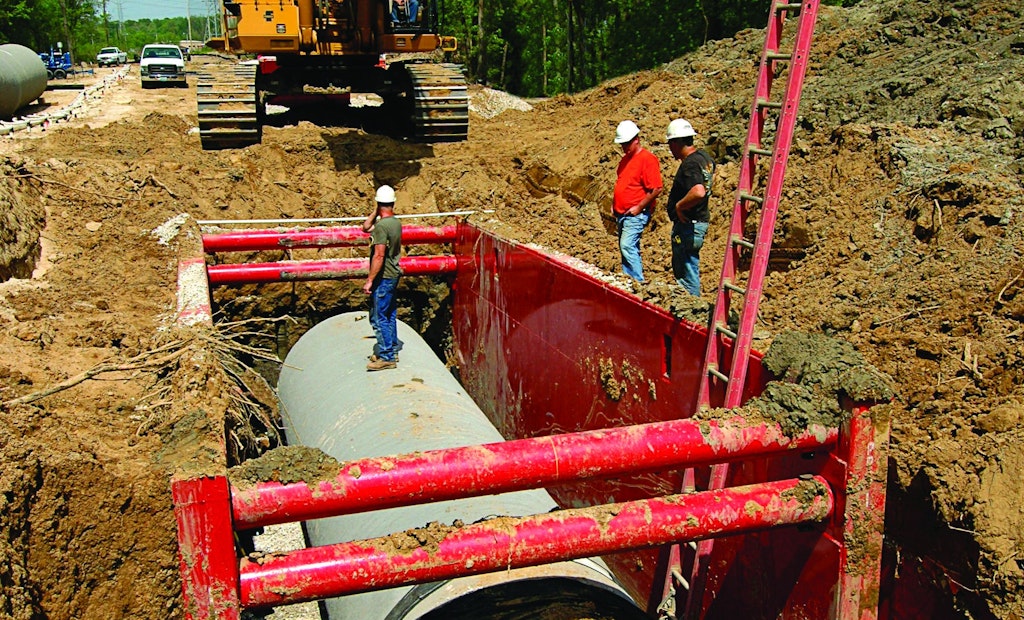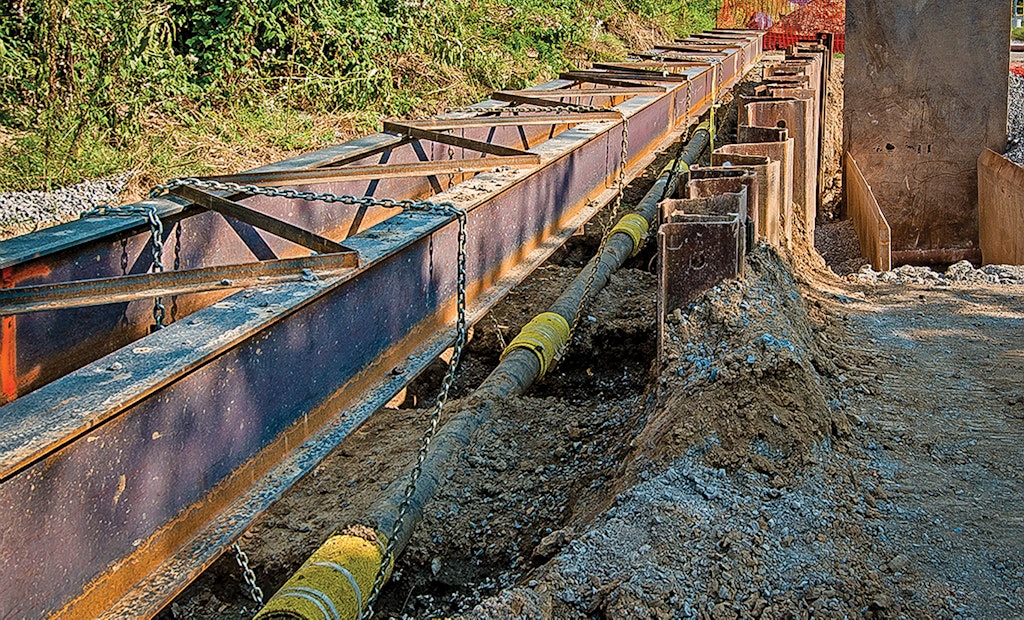Trench Protective Systems Include Which of the Following
Sloping the sides of the excavation to an angle not steeper than 1½1 for every foot of depth the trench must be excavated back 1½ feet. Protective systems include support systems sloping and benching systems shield systems and other systems that provide the necessary protection.

Three Primary Protection Methods In Excavation Sloping Shoring And Shielding
Which of the following is an excavation hazard.

. Other excavation safety measures include. The following procedures will apply to all Texas AM University-Commerce employees and contractors. 1926652 a Protection of employees in excavations.
Set spoils and equipment at least 2 feet back from the excavation. Because of the trench s proximity to a preexisting fire hydrant a sidewalk and a building 2 Shoring is support placed inside trenches to keep the sides from collapsing. All the above 9.
Trench protective systems include which of the following. Upload your study docs or become a. Trench protective systems include which of the following.
Trench protective systems include which of the following. What is an example of a trench protective system. Shoring typically a system of timbers to support trench walls to prevent soil movement and cave-ins.
Use retaining devices such as a trench box that will extend above the top of the trench to prevent equipment and spoils from falling back into the excavation. Types of protective systems include sloping shoring and shielding. Appropriate protective systems to prevent a cave-in may include trench boxes shields benching andor appropriate sloping of trench sides.
Provide protection by one or more of the following. Protective systems such as sloping the ground benching the ground shoring the trench with supports such as planking or hydraulic jacks and shielding the trench using a trench box should be properly implemented at all times. Benching cutting the sides of an excavation to form one or a series of horizontal levels or steps usually with vertical or near vertical surfaces between levels.
Examples of protective systems that can be used to comply with the Excavation standards include. Set spoils and equipment at least 2 feet back from the excavation. OSHA also requires that a safe means of access or egress such as ladders steps and ramps be located within 25 feet of.
Slope of 1½1 Designing a sloping and benching system in accord with. Sloping or Benching cutting back the trench wall at an angle or a step pattern inclined away from the excavation trench. This method is the most common system used and protects workers with trench boxes or other types of supports to prevent soil cave-ins.
This type of protective systems involves excavating the sides of a trench to form one or a series of horizontal levels or steps. Excavation safety Trench safety Key points The OSHA standard for trenching and excavation requires protective systems for trenches that are 5 feet or deeper unless the excavation occurs in stable rock. Other protective systems include benching which involves cutting step -like ledges into thewalls of trench.
Types of protective systems include sloping shoring and. A slope of this gradation is safe for any type of soil. Although mechanical failures do occur most incidents with machinery that result in injury can be attributed to.
Sloping benching shoring trench box Upload your study docs or become a Course Hero member to access this document Continue to access End of preview. Sloping benching shoring trench box B. Saskatchewan Labour defines a temporary protective structure as a structure or device in an excavation trench tunnel or excavated shaft that is designed to provide protection from cave-ins collapse sliding or rolling materials and includes shoring trench boxes trench shields and similar structures.
Use retaining devices such as a trench box that will extend above the top of the trench to prevent equipment and spoils from falling back into the excavation. This type of protective systems involves cutting back the trench wall. Trenching protective systems include.
1926652 a 1 i Excavations are made entirely in stable rock. Want to read all 2 pages. Excavation and Trench Safety Rev 2-2018 122018 12-2019 12-2020 11-2021 291 PURPOSE 292 REQUIREMENTS 293 VERIFICATION OF SOIL TYPE 294 PROTECTIVE SYSTEMS 295 EMPLOYEE TRAINING 296 PERMITS Exhibit 29A OSHA Trenching and Excavation Safety.
Test for low oxygen and hazardous gases and vapors especially when gasoline engine-driven equipment is running or the soil has been contaminated by leaking lines or storage tanks. Protective systems include. Ramp means an inclined walking or working surface that is used to gain access to one point from another and is constructed from earth or from structural materials such as steel or wood.
This method requires installing aluminum hydraulic pneumatic other types of supports to shore up the trench face prevent movement of soil. Sloping cutting back the trench wall at an angle inclined away from the excavation. 1926652 a 1 Each employee in an excavation shall be protected from cave-ins by an adequate protective system designed in accordance with paragraph b or c of this section except when.
A trench excavation is a narrow excavation made below the surface of the ground where the depth is greater than the width but the width of a trench measured at the bottom is less than 15 feet.

Pin On Corrosion Protection Coating

Bamboo Shield Instruction Steps Bamboo Bamboo Barrier Root Barrier

Trenching And Excavation Safety English Occupational Health And Safety Health And Safety Poster Workplace Safety

U S Trench Drain Compact Series 5 4 In W X 3 2 In D X 39 4 In L Black Channel And Sandstone Grate With Bottom Outlet 83519 The Home Depot Trench Drain Trench Drain Systems Drainage Solutions

U S Trench Drain Deep Series Tee For 5 4 In Trench And Channel Drain Systems W Galvanized Steel Grate 83900 Trench Drain Trench Drain Systems Galvanized Steel

5 Steps To Prevent Trench Collapses Municipal Sewer And Water

Trench And Excavation Safety Protection Methods Oshacademy Free Online Training

Compact Series 5 4 In W X 3 2 In D X 39 4 In L Trench And Channel Drain Kit W Terracotta Grate 3 Pk Trench Drain Trench Drain Systems Drainage Solutions

Trenching And Excavation Hazards Are One Of The Most Hazardous Construction Operations And Trench Related Fatalities Have Excavation Construction Safety Hazard

Nosucism Ns 14 Coat Coat Nosucism Ns14 Coat Jackets Coats Jackets

Three Primary Protection Methods In Excavation Sloping Shoring And Shielding

What Is A Protective System For Trenches Construction Equipment

Drainage Specialist Foundation Repairs Foundation Retrofits Serving Los Angeles And Adja Retaining Wall Drainage Retaining Wall Building A Retaining Wall

Excavation Safety Excavation Support Structure Deep Foundation

14 Steps To Ensure Safety In And Around Trenches And Cleaner

Trenching And Excavation Safety English Occupational Health And Safety Health And Safety Poster Workplace Safety

